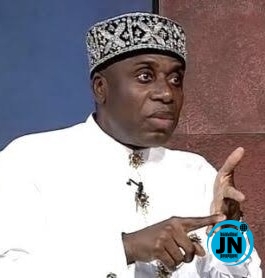Former Rivers State Governor, Rotimi Amaechi, has strongly criticized the ongoing political feud between Federal Capital Territory (FCT) Minister Nyesom Wike and suspended Rivers State Governor Siminalayi Fubara, describing it as a selfish battle over financial control rather than a dispute about governance or the welfare of the people.
In a recent interview with DW, Amaechi expressed his concerns about the situation, stating that the core issue at the heart of the crisis is the control and distribution of state funds. He lamented that Nigerians have failed to hold their leaders accountable, urging the public to demand transparency and clarity from both Wike and Fubara regarding the root cause of their conflict.

Amaechi did not mince words in his assessment of the situation, stating, “The fight between the current governor of Rivers State and the FCT minister is about sharing money. If not, what’s the quarrel? Nigerians don’t dislike corruption anymore. I’ve not seen anybody on the street questioning what the problem is. Can both of them speak to the public and tell us what the problem is about?”
His remarks follow President Bola Tinubu’s decision on March 18, 2025, to declare a state of emergency in Rivers State.
As part of the emergency measures, Governor Fubara, his deputy Ngozi Odu, and the entire Rivers State House of Assembly were suspended from office. President Tinubu appointed Vice Admiral Ibok-Ete Ekwe Ibas (Rtd.) as the Sole Administrator to oversee the state’s affairs. Tinubu defended the decision, citing political instability and increasing cases of pipeline vandalism as justifications for the emergency rule.
Amaechi, however, vehemently opposed the move, arguing that the imposition of emergency rule in Rivers State sets a dangerous precedent. He warned that such actions could be used as a political tool to intimidate and remove governors who do not align with the federal government’s interests, particularly ahead of the 2027 general elections.
“The president wants a power grab. They want to frighten governors who may not support them in 2027,” Amaechi alleged. “This is not about Rivers State alone; it is a warning to every other governor that if they do not align with the powers that be, they could face a similar fate.”
He further challenged the federal government’s rationale for imposing emergency rule, questioning why other states facing even more severe security issues have not been subjected to the same treatment. Amaechi cited instances of widespread insecurity in other parts of the country, emphasizing that the justification given for the Rivers State takeover lacked merit.
“If the president said it is because of insecurity, because they blew the pipeline, what about parts of the country where there is insecurity? Is the president saying they should impose emergency rule on him too?” Amaechi asked rhetorically.
Additionally, the former governor defended Fubara, asserting that security matters are primarily under the jurisdiction of the federal government and not the responsibility of the state governor. He argued that Fubara had not committed any offense significant enough to warrant his removal from office.
“Rivers governor has no security responsibility; it rests squarely on the president. So why punish a man who did not commit an offense?” Amaechi questioned.
Amaechi’s comments have reignited discussions about the true nature of the Rivers State political crisis, with many Nigerians calling for greater transparency and accountability from both Wike and Fubara. As the situation unfolds, political observers continue to watch closely to see how the power struggle in Rivers State will impact the larger political landsc
ape in the country.

